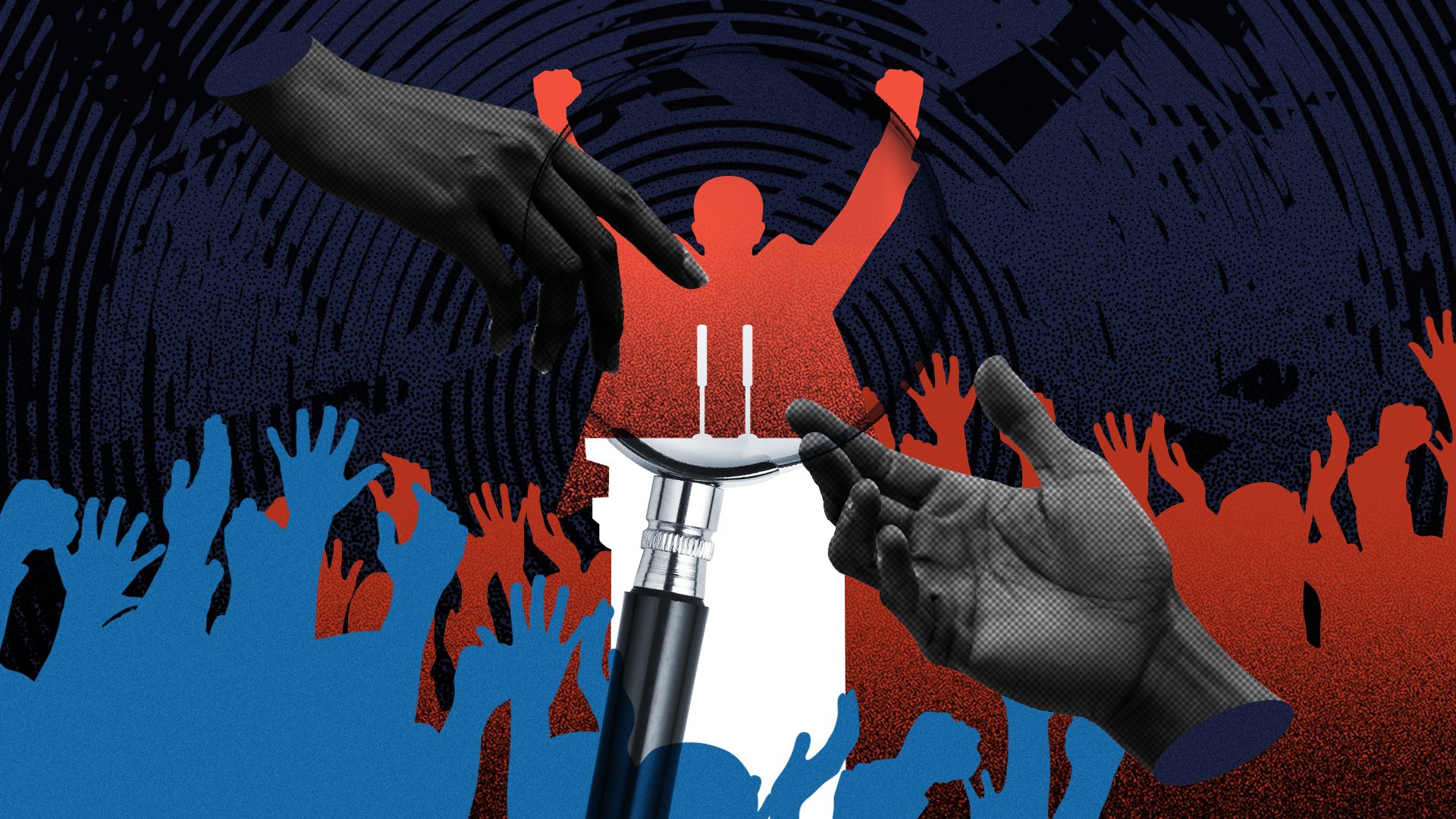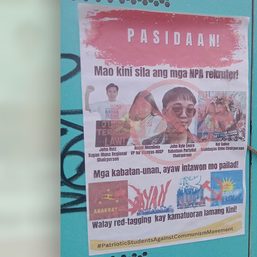SUMMARY
This is AI generated summarization, which may have errors. For context, always refer to the full article.

“The Passion of Fans: How fandom practices can encourage more active participation and help fight disinformation” is a study presented by the authors in a #FactsFirstPH research briefing held on April 29, 2022. The full copy of the research is reposted with permission from the authors.
First of 3 parts
Read the other parts of this series:
Part 2: In the spirit of beauty pageants: Celebrification in politics
Part 3: The passion of fans: How fandom practices can encourage more active participation and help fight disinformation
How fans turned to social media to criticize and demand action from celebrities
Last June 2020, former US President Donald Trump walked into a half-empty campaign rally at the Bank of Oklahoma Center. Trump, often the source of disinformation himself, fully expected the venue to be full of supporters since early figures showed almost a million people reserving for tickets. It was the K-pop fans who took credit for helping inflate the figures leaving Trump not only furious about the event, but also revealing an unlikely ally in the fight against online disinformation – the fans.
This series of articles explore specific cases of the connection between politics, the entertainment industry, and fandom. In particular, it looks at how fan behavior affected celebrities like Toni Gonzaga and Karla Estrada and how fandom practices have spilled over to the domain of politics so much so that supporters of politicians mimic fan behavior while at the same time treating these politicians like celebrities. Lastly, we also look at how fandom can actually complement the fight against disinformation and offer a new model of citizen participation and social movements through the notion of joyful participation.
The following keywords and hashtags were used for this study: #ToniGonzaga, #BBEToni, #UnbotheredQueenToniG, #NoToABSCBNShutdown, #bothered, #BBM, Karla Estrada, Queen Mother, Tingog Partylist, #KathnielGising, #WithdrawKarlaEstrada. The data was collected during the following period:
- October 2015 to May 2016 to cover the 2016 vice presidential elections, which was the first time that Toni Gonzaga’s endorsement of Bongbong Marcos gained criticism.
- May 2020-August 2020 to cover the ABS-CBN shutdown issue – an incident that mobilized ABS-CBN Kapamilya fans.
- October 2021 to February 2022 to cover the filing of candidacy for the 2022 Presidential elections.
- Memes created by Leni-Kiko and Uniteam supporters found within the 2022 election period.

The data was analyzed by looking at the posts that had the most engagement in terms of likes, shares, and comments. We looked at the prominent pages that drove these conversations and looked at emerging themes in terms of captions and framing. For the second part, we looked at online citizen practices, focusing on those supporting the top two presidential candidates, and found that two different unifying themes seemed to be guiding how these people were engaging politically.
Toni Gonzaga and the ABS-CBN Shutdown
The main question that guided the first part of this study was how the fans made use of social media in this politically-charged climate and what happened to the celebrities, who in the eyes of the fans, should have done more in terms of certain issues and concerns.
Let us look at the case of Toni Gonzaga first. Last July 2020, the House of Representatives voted not to renew the franchise of ABS-CBN, the country’s biggest media company in what was seen as President Rodrigo Duterte’s assault on press freedom. Celebrities like Angel Locsin, Enchong Dee, Anne Curtis, Janine Gutierrez, Kathryn Bernardo, and Daniel Padilla, among others, were applauded by Kapamilya fans for taking a stand against the non-renewal of the franchise, but there were celebrities who were called out on social media for staying silent about the issue. The celebrities who were called out included Sarah Geronimo (a Viva contract artist but has shows on the network), sisters Toni and Alex Gonzaga, and husband and wife Robin and Mariel Padilla, who were all contract stars of ABS-CBN.
In particular, Toni Gonzaga’s silence was singled out by a lot of Kapamilya fans probably because she was also considered as one of the network’s most popular stars. Starting with this issue, Toni Gonzaga became a polarizing figure in the eyes of the fans and netizens, especially to those who were for and against President Duterte, and then continuing to the time that she showed support for Bongbong Marcos. Below are some of the findings:
- When the National Telecommunications Commission (NTC) issued a cease and desist order against ABS-CBN on May 5, 2020, social media was abuzz as Kapamilya fans and celebrities condemned the NTC order. In the official ABS-CBN Facebook page, a curated post which includes Toni Gonzaga’s Instagram post about the closure, was able to garner 7,919 like reactions, 2,562 comments, 1,794 sad reactions, and 2,149 care reactions.
- However, this positive framing of ABS-CBN on the support of their stars was trumped, engagement-wise, by an article from PEP.ph entitled Toni and Alex Gonzaga, Robin Padilla draw flak after showing support for ABS-CBN. This was shared on their FB page with a caption: Tinawag silang “enabler,” “plastic,” “hypocrite,” at “DDS”. From the time the NTC issued the cease and desist order to the time when the House of Representatives denied the renewal of franchise, this post still had the most like reactions (26,841), shares (1,782), comments (4,653), and laugh reactions (6,765).
- There were a number of Facebook pages associated with President Duterte and other political figures such as Pacquiao PH, Latest Duterte News, Duterte Solid Supporters, Anak Ni Digong Sara Daughter30, and Philippine Federal Movement International which shared content that had to do with the franchise issue, especially the ones about Toni Gonzaga. It was a manifestation of how Facebook pages of political figures were also preoccupied with celebrity news, especially ones that had a connection to President Duterte since social media has become largely polarized prior to and during his term.
- When you scroll through the comments on pages associated with President Duterte, there are supporters who are angry towards Toni Gonzaga for speaking up on the issue since she was initially considered as a supporter of the current administration. But on celebrity Facebook pages, the comments also reflected the anger towards Toni Gonzaga for not joining the ABS-CBN rallies or for not speaking out enough.
- It was around this time that the framing of these articles began to highlight that it was the Kapamilya fans, including fans of various celebrities, who were the source of criticism as reflected in the coverage of news outlets and in the captions of Facebook posts.
- When the House of Representatives voted not to renew the franchise in July, the announcement was met with anger and protest not only from journalists and press freedom advocates, but also from the Kapamilya fans with the hashtag #NoToABSCBNShutdown gaining 181,000 engagement on Facebook alone.
- The same framing of fans as being behind calls for celebrities to speak up resurfaced around this time. A YouTube video entitled Netizen, MINURA sina SARAH GERONIMO, TONI GONZAGA at ALEX GONZAGA!! was widely shared and circulated in various celebrity and political Facebook pages. The video contains screenshots of tweets showing the anger and frustration of fans on Twitter regarding the closure of ABS-CBN and directed largely at Toni Gonzaga’s silence.
- This might be the reason why Toni Gonzaga released a statement sympathetic to the 11,000 employees of ABS-CBN a few days after the franchise was denied. While her statement was released in the social media pages of various media outlets, the highest engagement (30,057 likes, 1,406 shares, 2,615 comments, 18,532 love reactions, and 3,719 care reactions) came from the Facebook Page of Kapamilya Online World, an unofficial online community of Kapamilya fans.
Karla Estrada and Kathniel
To a lesser extent, Karla Estrada’s entanglement in both politics and entertainment and getting brushed off by fans was similar to Toni Gonzaga’s story. Being the mother of Daniel Padilla, the other half (with Kathryn Bernardo) of one of most popular loveteams in the country, Kathniel, Karla Estrada also found herself at the center of criticism. She incurred the anger of Kathniel fans because of the ABS-CBN shutdown and her support for the UniTeam. However, unlike Toni Gonzaga whose main criticism was about her silence, Karla Estrada was largely criticized for allying herself with Tingog Sinirangan party-list, whose current representative, Yedda Romualdez, voted against the renewal. The data showed the following:
- In terms of timeline, the criticism against Karla Estrada only started when she was announced as one of the nominees for the Tingog party-list in October 2021. In fact the #WithdrawKarlaEstrada hashtag immediately trended after the announcement. The criticism became more prominent as the campaign period began in February 2022.
- The Facebook post with the highest engagement came from the tabloid Bandera with 65,634 likes, 3,344 shares, 9,386 comments and 4,599 love reactions. The caption referenced Karla Estrada and Toni Gonzaga’s similar fates and the role played by netizens who criticized them (Bukod kay Toni Gonzaga, isa pang Kapamilya TV host-actress na naiintriga at naba-bash ngayon dahil sa politika — ang nanay ni Daniel Padilla na si Karla Estrada). Other Facebook posts with the most number of engagements like those by Abante and Manila Bulletin also echoed the same framing, including how these two chose to ally themselves with the campaign of Uniteam.
- Scrolling through the Twitter and Facebook posts, the assertiveness of Kathniel fans on this issue had more to do with their concern over how this could tarnish the reputation of Daniel Padilla more than Karla Estrada herself.
- In terms of the ABS-CBN issue, the majority of the social media posts about Karla Estrada came from established media organizations rather than Facebook pages created by individuals or organizations affiliated with political figures or celebrity fan pages.
Fans as part of call-out culture
What does this data reveal about the conversations happening online? Toni Gonzaga, together with Karla Estrada, are examples of the thin line between politics and entertainment in the Philippines.
In these specific cases, we can see how fans played an important role in driving conversations and criticizing particular celebrities on specific issues. This power is also getting recognized by journalists themselves and even media outlets as the framing of their stories emphasize that it was the fans who are calling out or criticizing these celebrities.
This is an indicator that fans are beginning to see their favorite celebrities or idols as more than entertainment figures, but as an integral part of the country’s political landscape. Previously, these kinds of criticism were largely ignored since the calls for celebrities to be more political were not as amplified as it is now. But in the age of social media where instant feedback is the norm, these criticisms and call-outs can really have consequences for these celebrities. – Rappler.com
Cherish Aileen Aguilar Brillon is an Associate Professor at the UP Diliman College of Mass Communication, Broadcast Communication Department. She is also part of DZUP 1602, the official radio station of the UP community, where she is the committee head for research and online programming. Her research interests include political economy of media, gender, fandom, cultural memory, and superheroes.
Gerard Martin C. Suarez is a PhD Media Studies student at the College of Mass Communication at UP Diliman. His research on media topics is anchored on the elites, propaganda, and civic participation. He also works as a researcher for the Center for Local and Regional Governance, focusing on topics related to Philippine local government units.
Add a comment
How does this make you feel?















There are no comments yet. Add your comment to start the conversation.